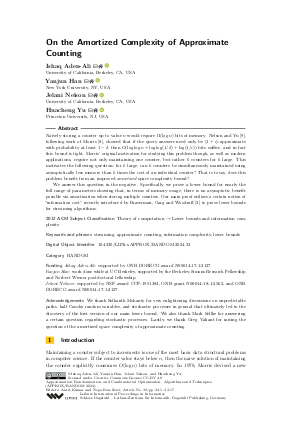On the Amortized Complexity of Approximate Counting
Authors
Ishaq Aden-Ali  ,
Yanjun Han
,
Yanjun Han  ,
Jelani Nelson
,
Jelani Nelson  ,
Huacheng Yu
,
Huacheng Yu 
-
Part of:
Volume:
Approximation, Randomization, and Combinatorial Optimization. Algorithms and Techniques (APPROX/RANDOM 2024)
Part of: Series: Leibniz International Proceedings in Informatics (LIPIcs)
Part of: Conference: International Conference on Approximation Algorithms for Combinatorial Optimization Problems (APPROX)
Part of: Conference: International Conference on Randomization and Computation (RANDOM) - License:
 Creative Commons Attribution 4.0 International license
Creative Commons Attribution 4.0 International license
- Publication Date: 2024-09-16
File

PDF
LIPIcs.APPROX-RANDOM.2024.33.pdf
- Filesize: 0.78 MB
- 17 pages
Document Identifiers
Subject Classification
ACM Subject Classification
- Theory of computation → Lower bounds and information complexity
Keywords
- streaming
- approximate counting
- information complexity
- lower bounds
Metrics
- Access Statistics
-
Total Accesses (updated on a weekly basis)
0PDF Downloads0Metadata Views
Abstract
Naively storing a counter up to value n would require Ω(log n) bits of memory. Nelson and Yu [Jelani Nelson and Huacheng Yu, 2022], following work of Morris [Robert H. Morris, 1978], showed that if the query answers need only be (1+ε)-approximate with probability at least 1 - δ, then O(log log n + log log(1/δ) + log(1/ε)) bits suffice, and in fact this bound is tight. Morris' original motivation for studying this problem though, as well as modern applications, require not only maintaining one counter, but rather k counters for k large. This motivates the following question: for k large, can k counters be simultaneously maintained using asymptotically less memory than k times the cost of an individual counter? That is to say, does this problem benefit from an improved amortized space complexity bound? We answer this question in the negative. Specifically, we prove a lower bound for nearly the full range of parameters showing that, in terms of memory usage, there is no asymptotic benefit possible via amortization when storing multiple counters. Our main proof utilizes a certain notion of "information cost" recently introduced by Braverman, Garg and Woodruff [Mark Braverman et al., 2020] to prove lower bounds for streaming algorithms.
Cite As Get BibTex
Ishaq Aden-Ali, Yanjun Han, Jelani Nelson, and Huacheng Yu. On the Amortized Complexity of Approximate Counting. In Approximation, Randomization, and Combinatorial Optimization. Algorithms and Techniques (APPROX/RANDOM 2024). Leibniz International Proceedings in Informatics (LIPIcs), Volume 317, pp. 33:1-33:17, Schloss Dagstuhl – Leibniz-Zentrum für Informatik (2024)
https://doi.org/10.4230/LIPIcs.APPROX/RANDOM.2024.33
BibTex
@InProceedings{adenali_et_al:LIPIcs.APPROX/RANDOM.2024.33,
author = {Aden-Ali, Ishaq and Han, Yanjun and Nelson, Jelani and Yu, Huacheng},
title = {{On the Amortized Complexity of Approximate Counting}},
booktitle = {Approximation, Randomization, and Combinatorial Optimization. Algorithms and Techniques (APPROX/RANDOM 2024)},
pages = {33:1--33:17},
series = {Leibniz International Proceedings in Informatics (LIPIcs)},
ISBN = {978-3-95977-348-5},
ISSN = {1868-8969},
year = {2024},
volume = {317},
editor = {Kumar, Amit and Ron-Zewi, Noga},
publisher = {Schloss Dagstuhl -- Leibniz-Zentrum f{\"u}r Informatik},
address = {Dagstuhl, Germany},
URL = {https://drops.dagstuhl.de/entities/document/10.4230/LIPIcs.APPROX/RANDOM.2024.33},
URN = {urn:nbn:de:0030-drops-210264},
doi = {10.4230/LIPIcs.APPROX/RANDOM.2024.33},
annote = {Keywords: streaming, approximate counting, information complexity, lower bounds}
}
Author Details
Funding
- Aden-Ali, Ishaq: supported by ONR DORECG award N00014-17-1-2127.
- Han, Yanjun: work done while at UC Berkeley, supported by the Berkeley-Simons Research Fellowship and Norbert Wiener postdoctoral fellowship.
- Nelson, Jelani: supported by NSF award CCF-1951384, ONR grant N00014-18-1-2562, and ONR DORECG award N00014-17-1-2127.
Acknowledgements
We thank Sidhanth Mohanty for very enlightening discussions on unpredictable paths, half Cauchy random variables, and stochastic processes in general that ultimately led to the discovery of the first version of our main lower bound. We also thank Mark Sellke for answering a certain question regarding stochastic processes. Lastly, we thank Greg Valiant for raising the question of the amortized space complexity of approximate counting.
References
-
Ziv Bar-Yossef, T. S. Jayram, Ravi Kumar, and D. Sivakumar. An information statistics approach to data stream and communication complexity. J. Comput. Syst. Sci., 68(4):702-732, 2004.

-
Mark Braverman, Sumegha Garg, and David P. Woodruff. The coin problem with applications to data streams. In Proceedings of the 61st IEEE Annual Symposium on Foundations of Computer Science (FOCS), pages 318-329, 2020.

-
Amit Chakrabarti, Yaoyun Shi, Anthony Wirth, and Andrew Chi-Chih Yao. Informational complexity and the direct sum problem for simultaneous message complexity. In Proceedings of the 42nd Annual Symposium on Foundations of Computer Science (FOCS), pages 270-278, 2001.

- Thomas M. Cover and Joy A. Thomas. Elements of information theory. Wiley, 2 edition, 2006. URL: http://www.elementsofinformationtheory.com/.
-
Ronald L. Graham, Donald E. Knuth, and Oren Patashnik. Concrete Mathematics: A Foundation for Computer Science, 2nd Ed. Addison-Wesley, 1994.

- Elena Kolevska. What happens with Redis runs out of memory, December 2018. URL: https://www.youtube.com/watch?v=Xjq5XL2u3po.
- Jérémie Lumbroso. The story of HyperLogLog: How Flajolet processed streams with coin flips. CoRR, abs/1805.00612, 2018. URL: https://arxiv.org/abs/1805.00612.
-
Robert H. Morris. Counting large numbers of events in small registers. Commun. ACM, 21(10):840-842, 1978.

-
Jelani Nelson and Huacheng Yu. Optimal bounds for approximate counting. In Proceedings of the 41st ACM International Conference on Principles of Database Systems (PODS), pages 119-127, 2022.

-
Michael Sipser. Introduction to the theory of computation. PWS Publishing Company, 1997.

